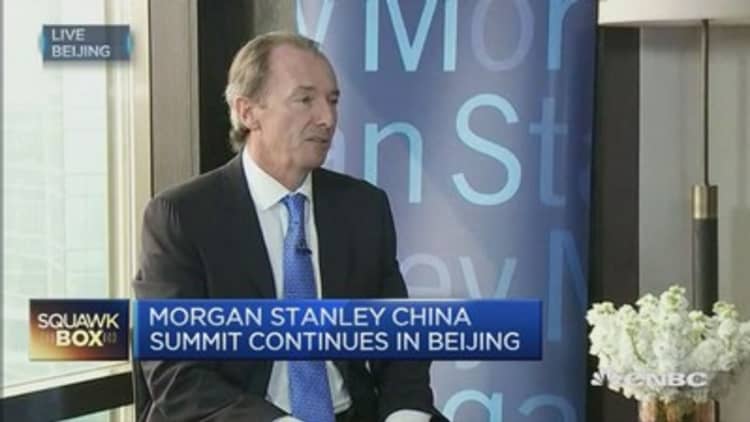
Morgan Stanley Chairman and CEO James Gorman defended the 25 percent pay hike he was awarded last year – reportedly the highest among Wall Street chief executives – saying it was justified by the bank's performance.
"We had three years where the stock went up," Gorman told CNBC on the sidelines of the Morgan Stanley China Summit in Beijing on Thursday. "So the board, representing shareholders, thought that justified very strong performance, not just for myself, but for the leadership of the firm."
Shares of the bank have risen handsomely over past three years, up 19 percent in 2012, 60 percent in 2013 and 23 percent in 2014.
"By the same token, in previous years, when we underperformed, we were payed down and that's the way it should be," he said.
Gorman's pay raise brought his total compensation to $22.5 million in 2014, above that of Jamie Dimon, the chief executive of JPMorgan Chase, but below that of Lloyd Blankfein, the chief executive of Goldman Sachs, according to the New York Times.
(Read MoreMorgan Stanley chief lands $22.5 million pay package)
The debate around bankers' pay returned to the fore in recent days after a sizable portion of JPMorgan shareholders objected to Dimon's pay package at the company's annual meeting held on April 19.
Over 38 percent of shareholders voted against the compensation of Dimon and other top executives at the bank, according to the Financial Times.
"[Banker compensation] is the issue of the day. These things can become very emotional and like everything, there's an overreaction, so I wouldn't read too much into it. Jamie Dimon is doing a great job; JP Morgan is a great institution," said Gorman.
Where's China headed?
Switching gears, Gorman shared his views on China, where the conference is being held.
He used the word "bullish," to sum up his outlook for the world's second-biggest economy. Despite China's growth slowdown, Gorman is confident on the long term prospects for the world's second largest economy and its stock market.
"A lot of people say to me: 'But China was growing at 9 percent or 10 percent,' and we should somehow be disappointed that an economy about the size of the U.S. economy is growing at about 7 percent," he asked. "What's going on in China remains incredibly exciting just because of the sheer magnitude of the economy."
Gorman cautions investors not to get too excited about the meteoric rise in the country's stock market.
"I hope that people aren't too excited about short-term rallies – or falls – the markets aren't always rationale in the very short term. Obviously it's been an extraordinary run for the month of April," he said.
China's benchmark Shanghai Composite rallied almost 20 percent in April. The index's year-to-date gains stand at 54 percent.
"But we need to step back and focus on the fundamentals – where will China be in the next 5, 10, 20 years from now? That's what the long term investors are focused on. And the story is a great story – tremendous change to come [and] tremendous challenges – but I'm bullish on China," he said.
Fed to hike this year
On when the U.S. Federal Reserve will start hiking rates, Gorman said he expects liftoff to begin later this year.
"I expect rates to go up this year for the simple reason that zero percent interest rates indicate an economy in crisis. There is no emergency in the U.S., [it] is getting stronger," he said.
"Look at the facts – the financial sector is strong, consumer debt has dropped dramatically since the crisis, 401K plans have had 10-15 percent increases three years in a row," he added.
At some point if you keep rates too low, there's a risk of an asset bubble, he said. "That's the bigger issue on my mind."


